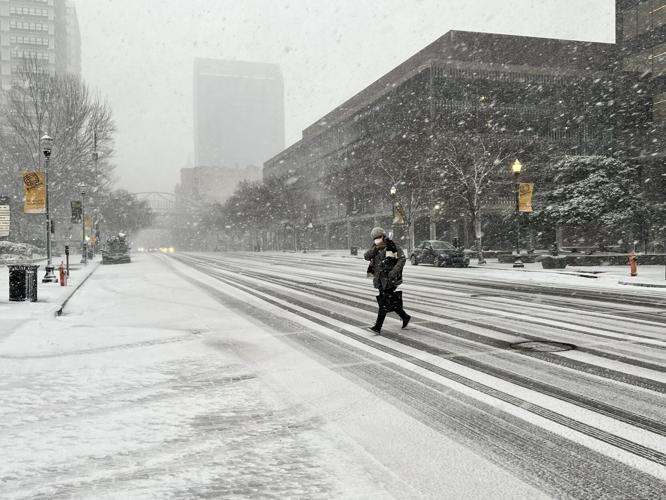LOUISVILLE, Ky. (WDRB) -- Louisville health experts are warning about potential health risks to look out for as dangerously cold temperatures descend upon the area.
Frigid weather increases the risks of hypothermia, frostbite, heart attacks and strokes. Cold weather can put more stress on your heart and increase blood pressure, which can increase the risk of heart attack and stroke, especially when working outside or shoveling snow in extreme conditions.
"Cold weather makes your heart work harder to keep you warm," said Dr. Zachary Harris, emergency medicine physician and medical director of emergency services at Norton Audubon Hospital. "So if you've got pre-existing conditions such as a bad heart or have had heart issues in the past, that could be an extra strain on an already strained heart."
Harris said to pay attention to chest pain. If you feel a crushing sensation in the center of your chest, you should seek medical attention immediately.
"There's other symptoms too: shortness of breath, especially if it comes on very quickly, pain in your arms and a stiffness in your jaw," he said. "Those sort of things can also be symptoms of a heart attack. Anything that happens really quickly and feels different than usual, especially a sensation you've never had before, that's very concerning, and you should get checked out for those things."

Norton Hospital (WDRB file photo)
Be sure to also pay attention for any symptoms of a stroke during the colder weather.
"If you could move your arm last night and you can't move it this morning, I would definitely come to the hospital emergently to be checked out," Harris said. "You don't want to risk losing the ability to move or feel any part of your body. If you can't talk and you used to, call 911."
There is also a higher risk for hypothermia in the coming days. Hypothermia is medical emergency that occurs when your body loses heat faster than it can produce heat. The normal body temperature is around 98 degrees Fahrenheit, and hypothermia happens when the body temperature falls below 95 degrees. While it most likely occurs during very cold temperatures, it can still occur at cool temperatures above 40 degrees. Some warning signs of hypothermia include shivering, slurred speech or confusion, shallow breathing, weak pulse, and drowsiness.
"If you keep getting colder, it can get more severe," Harris said. "You can stop shivering, which is bad, because that's your body's defense mechanism against the cold."
Another danger to be aware of is frostbite, or damage to the skin and tissue caused by freezing. When the temperature is below zero, it takes about 30 minutes for exposed skin to get frostbite. At 15 degrees below zero with even a little bit of wind, frostbite can happen within 15 minutes. Frostbite usually affects extremities like the nose, ears, cheeks, chin, fingers and toes. Frostbite can permanently damage the body and severe cases can lead to amputation. Symptoms include a loss of feeling and color in affected areas. A person experiencing frostbite can also feel tingling or a prickling sensation as the area becomes numb and the tissues freeze.
There are three stages of frostbite:
- Mild frostbite (frostnip): Irritation from the cold causes pain or numbness. You may feel a tingling, prickly sensation.
- Superficial frostbite: Skin layers have frozen farther down causing skin to turn light blue or grayish. You may experience a prickly, burning sensation, swelling, and the area might feel warm. Blisters can also appear within 12 to 36 hours.
- Deep frostbite (Severe): All layers of skin and the tissues beneath it have frozen significantly. Skin can turn white or a bluish gray and feel numb. Skin may also feel stiff and rubbery when touched. Joints and muscles may have difficulty working. Blisters may also appear within 24 to 48 hours, and the damaged skin will turn black.
If you suspect someone has hypothermia or frostbite, you should gently move the person indoors, remove any wet clothing and put them in warm, dry clothing and seek medical attention. If you experience a medical emergency, Harris said the best thing to do is call 911.
If you plan on drinking alcohol over the next few days, it's also important to be aware of how it can affect the body in cold weather.
"Alcohol is not the right solution to cold weather," Harris said. "It can blunt your response to the cold. So you might not notice that it's as cold as it is. It also makes your heart work harder to keep you warm."
The best way to avoid dangerous conditions is to stay inside and be prepared.
"If there's any way to stay inside, I would strongly recommend doing that, especially if you've got pre-existing conditions," Harris said. "Or you're up there in age, it's probably the best thing to try and stay inside if at all possible."
Harris said if you have to go outside, make sure to wear layers that ventilate. He also said to avoid wearing cotton close to the skin, because the fabric will trap moisture and will cause you to get colder much faster.
"If the roads aren't good, you getting out there and trying to get to the hospital in an unsafe situation just puts your life in more danger," Harris said. "It's safer to have medically-trained professionals come and get you to the hospital to make sure you don't have any bad outcomes or nothing bad happens to you while you need that care."
Harris said if you experience a more common or simple issue to visit an urgent care center as opposed to a hospital.
Norton emergency rooms and immediate care centers will be open during inclement weather. Telehealth and e-care services will also be open 24/7. For updates on delays or closures at Norton facilities, click here.
Copyright 2022 WDRB Media. All Rights Reserved.














